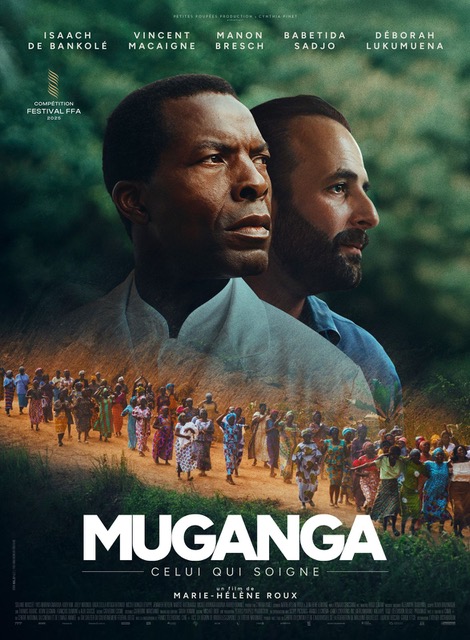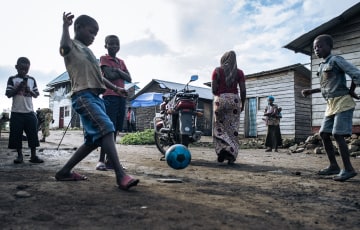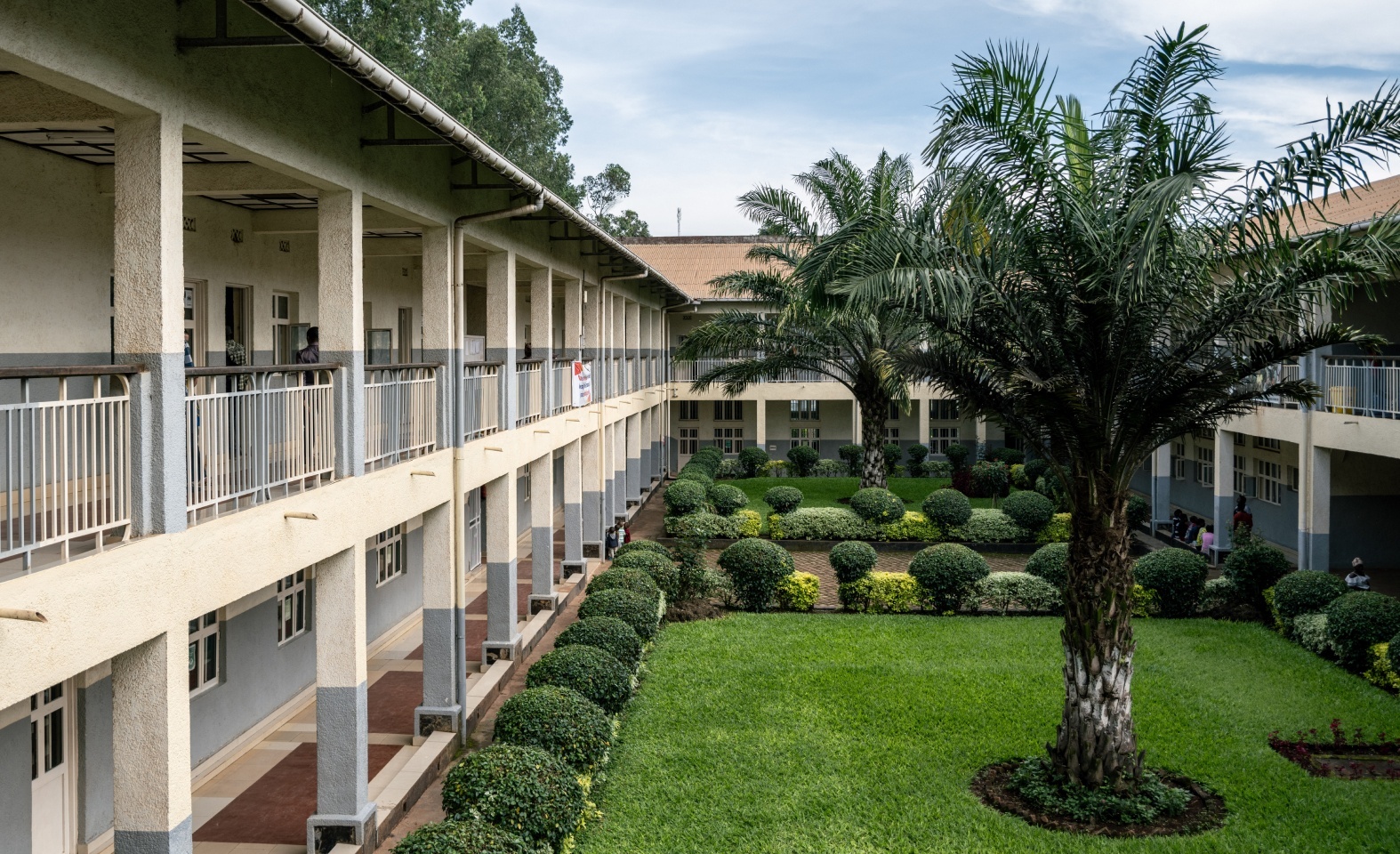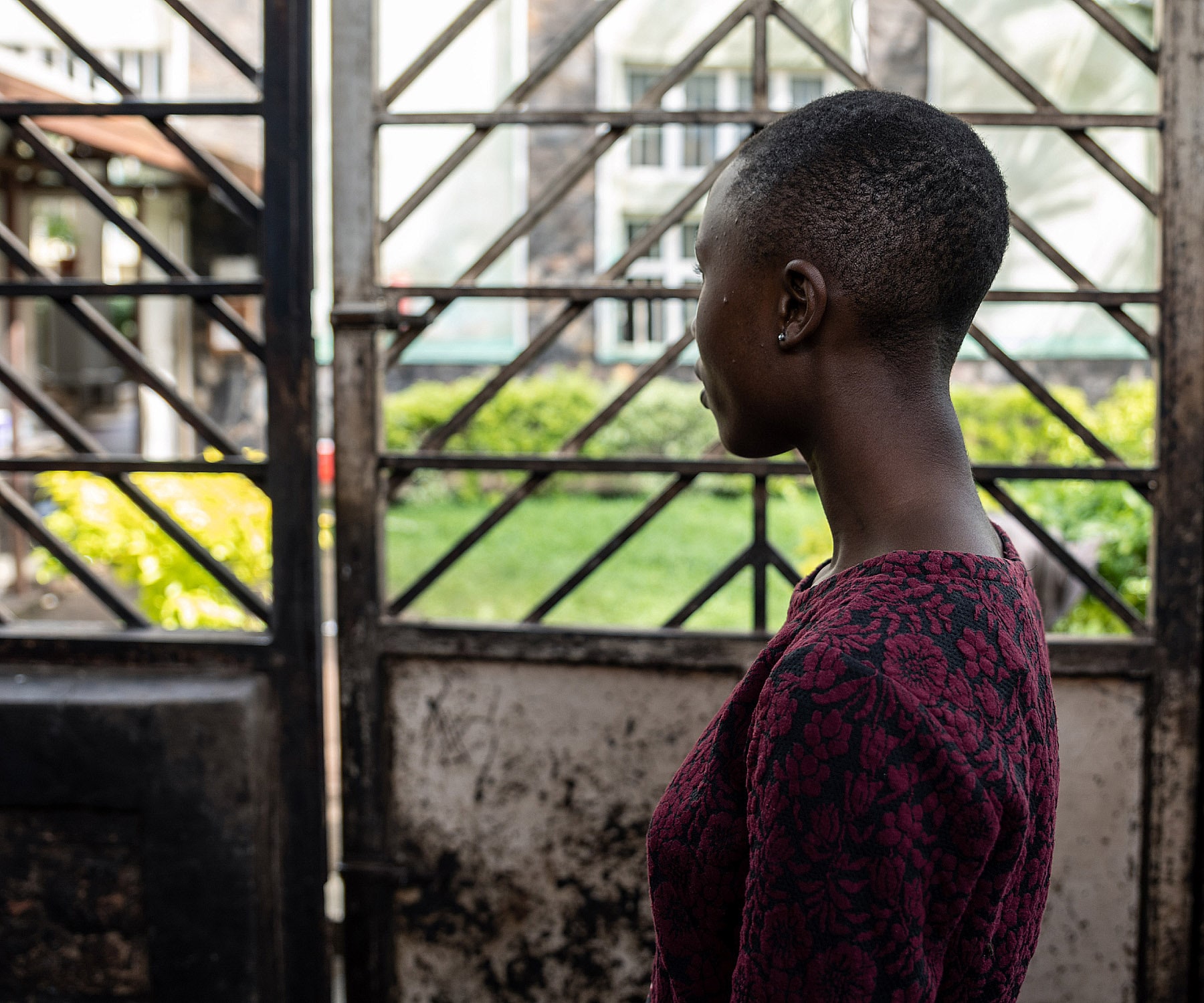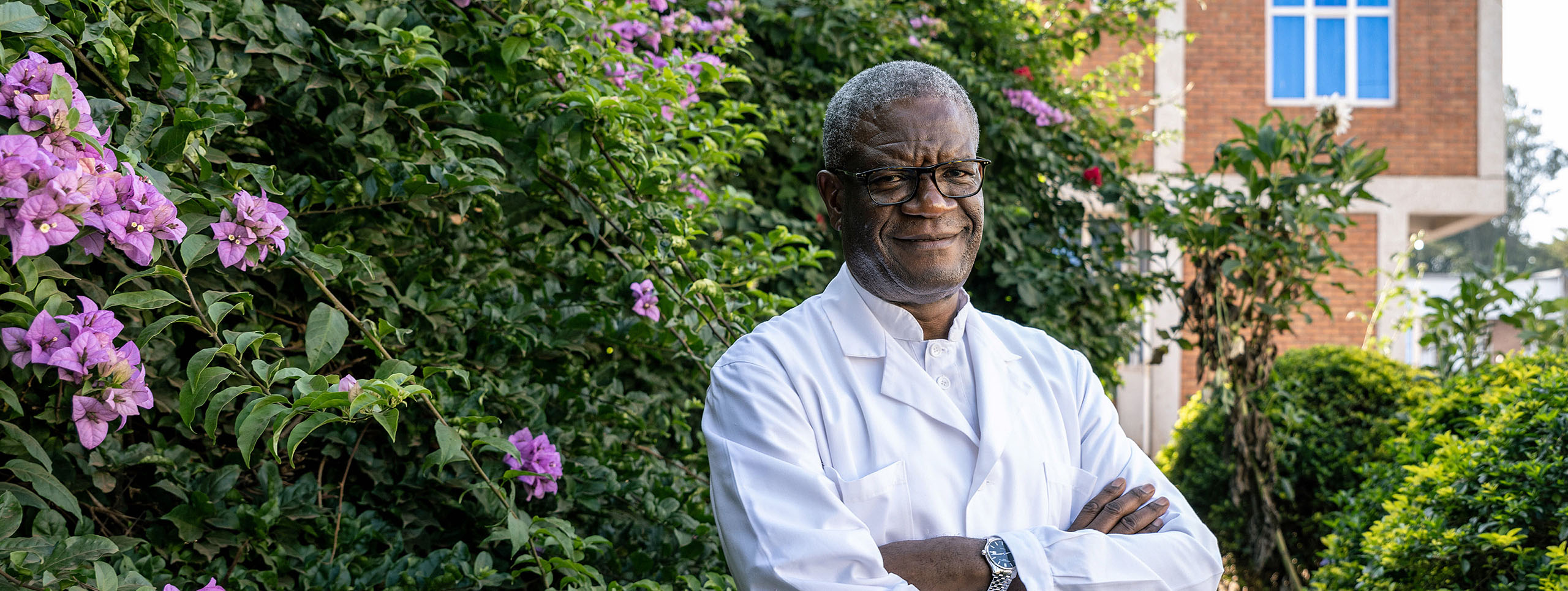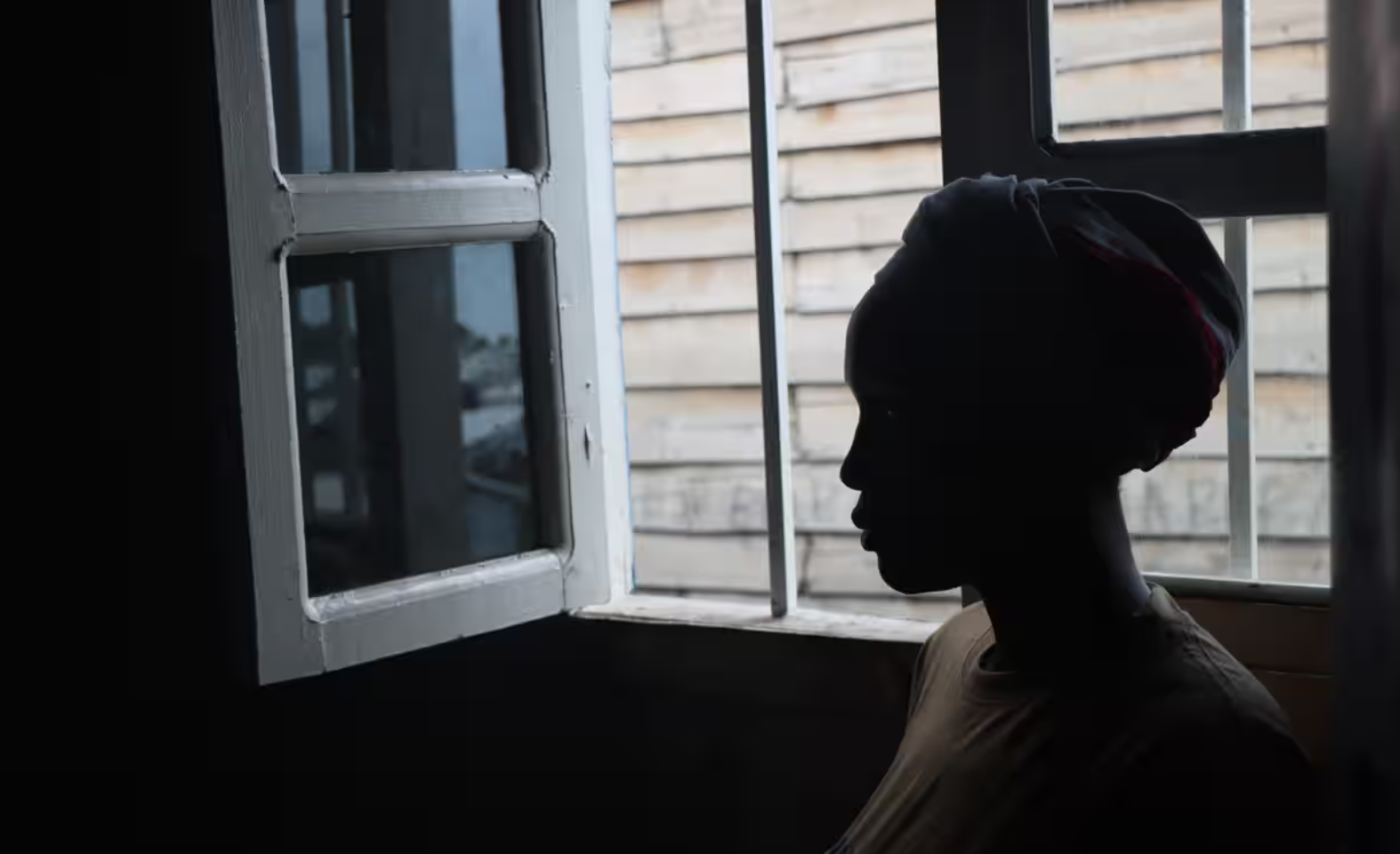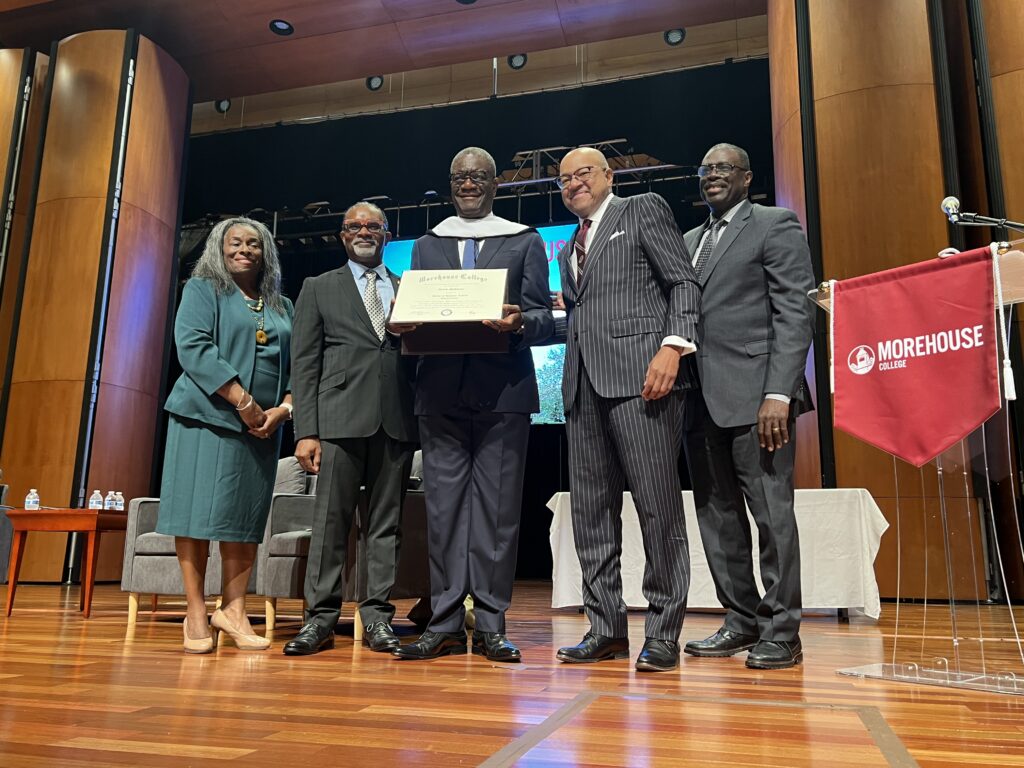
On Monday September 25, 2023, Dr. Denis Mukwege was awarded an Honorary Doctorate from Morhouse College, a prestigious institution steeped in history that symbolizes the struggle of African-Americans for civil rights in the United States.
On this occasion, he delivered the following speech at Morehouse College’s Crown Forum:
Watch the video of the speech on Youtube
”Ladies and Gentlemen of the Crown Forum at Morehouse College,’Ladies and Gentlemen of the Crown Forum at Morehouse College,
It is with humility that I accept the honorary degree from the esteemed Morehouse College. I am deeply grateful for the opportunity to address this prestigious audience at the Crown Forum, where I have been asked to speak on a critical and urgent topic: “The Challenge of the Congo.”
To grasp the complexities of our current struggles and chart a course for the future, let’s travel for a moment into the past, which is marked by the scars of slavery.
In the late 19th century, Western powers were redefining their relations with the African continent and its inhabitants. Laws were enacted to abolish or restrict the transatlantic slave trade. Here in the United States, slavery was abolished with the ratification of the 13th Amendment to the Constitution. However, as slavery declined, colonialism expanded. In 1885, negotiations between European powers at the Berlin Conference resulted in the partitioning of Africa. King Leopold II of Belgium was declared the owner of the so-called “The Congo Free State.”
While the West experienced an industrial revolution that brought progress and comfort to some, the heart of Africa suffered from slavery and forced labor to satisfy the colonial powers’ need for natural resources such as rubber. This ruthless exploitation exposed the Congolese people to discrimination, abuse, and institutionalized violence. This was exacerbated during the two world wars when the Congo’s natural resources, like copper and uranium, played crucial strategic roles.
During this same era, far across the ocean, the United States was in the midst of its own profound battle for justice and civil rights. Even though slavery had officially ended, the lives of Black individuals remained under threat, marked by daily lynchings and the implementation of the segregationist “Jim Crow” laws.
Visionaries like Dr. Martin Luther King Jr. were at the forefront of this fight, advocating for racial equality and justice for all. Despite the geographical distance, the struggles in Congo and the United States shared profound similarities: both movements sought to dismantle systemic injustices and inequalities.
As African nations declared their independence from colonial powers, a sense of hope and change gained unprecedented momentum. However, in the case of Congo, the vision of a peaceful, independent, and sovereign nation, championed by Patrice Lumumba, was tragically short-lived. Eleven days after declaring independence, a new internationalized secession war erupted due to fears of losing control over mining resources.
Ladies and Gentlemen,
It is well-known that Congo occupies a crucial place in geopolitics. In his seminal work, “The Challenge of the Congo,” Ghanaian leader Kwame Nkrumah astutely emphasizes that “the Congo is not simply a struggle of the Congolese people against Belgian colonialism; rather, it represents a wider struggle of all African peoples against Western domination.” The implications of this statement are profound: if Congo were to achieve independence and prosperity, Western powers would not only lose access to the wealth beneath Congolese soil, but they would also lose their grip on the entire continent. Fifty-six years after President Nkrumah penned these words, his thoughts remain profoundly pertinent.
As I stand before you today, 63 years after Congo’s independence, I cannot recount a story of prosperity, development, or peace. Instead, I bear witness to the predation, tragedy, and injustice of a war that persists in the eastern Democratic Republic of Congo (DRC).
The eastern region of Congo, home to a vast majority of the world’s tin, tungsten, tantalum, and gold reserves, has become a battleground. The demand for these strategic minerals significantly increased at the end of the 20th century, with the widespread diffusion of modern electronics, such as smartphones, laptops, and electric cars. The struggle for control of mines in the east fueled international and/or internationalized armed conflicts, resulting in the deaths of millions of Congolese people, the rape of millions of women, and mass displacement.
This is the deadliest conflict since World War II. No family has been spared from the inhuman brutality that has traumatized the population.
As a physician practicing in this war-torn context, I quickly became a witness to the horrors inflicted upon women in my community. Sexual violence became a weapon of war, used with devastating efficiency to terrorize indigenous populations and control mineral-rich areas.
In the face of this unimaginable suffering, we founded Panzi Hospital in Bukavu in 1999, a place of care and refuge for survivors of conflict-related sexual violence. Ten years later, the Panzi Foundation was established. Together, Panzi Hospital and the Foundation have since treated over 80,000 survivors, providing them with holistic care. From medical and psychosocial support to legal assistance and socio-economic reintegration, we seek to provide the tools and resources needed for victims to transform into survivors and agents of change. But despite the passage of time, the demand and the need for our services continues to grow – a stark reminder of the ongoing horrors of this conflict.
In the early days of the conflict, cases of rape were often characterized by extreme violence. This violence could lead to a medical complication known as a fistula. A fistula is an abnormal communication between the bladder and the vagina or between the rectum and the vagina. Since 1999, we have treated nearly 9,000 fistula cases at Panzi through surgical interventions.
The first successful treatment of a fistula is often attributed to James Marion Sims, a white American physician sometimes referred to as the “father of modern gynecology.” Sims practiced medicine in Alabama in the mid-19th century and performed numerous experimental surgeries on enslaved women with fistulas. These experiments took place in his backyard hospital, and shockingly, no anesthesia was administered during these operations.
Ladies and Gentlemen,
I am grateful to be able to use the medical skills passed down by my predecessors to repair the bodies of women in my country. However, I cannot ignore the exploitation of the women’s bodies on whom Dr. Sims operated. Today, I am deeply burdened by the fact that, despite two centuries of separation, women’s bodies continue to be tortured. While the use of rape as a weapon of war may not occur on a surgical table, its intention and the inflicted pain are no less severe.
This is unacceptable, but the war in eastern DRC and its dramatic consequences for women are only a symptom of a larger problem. For nearly 150 years, Congo has been subjected to exploitation beyond imagination. Many foreign interests benefit from instability and chaos, as evidenced by recent aggression supported by neighboring regimes like those in Kigali and Kampala. Leaders of these countries have exploited this war economy and the trade in “blood minerals” for decades. Greedy politicians and authorities collaborate with rebels and warlords, all driven by the desire to claim a share of Congo’s riches – which are up for grabs.
Today, at this very moment, my country is being looted, facilitated by the complicity of our own leaders and multinationals, who act with complete impunity while the international community remains indifferent.
Thus, we face the bitter realization that despite the abolition of slavery and the era of independence, the Congolese people, like other Black communities worldwide, are still subjected to a concealed form of slavery and brutal exploitation that keeps us in subhuman conditions.
The time has come to acknowledge the root causes of the cycles of violence in eastern Congo. The path to lasting peace is possible.
We must first acknowledge the role of national and international actors in perpetuating this conflict.
We must recognize the link between gross human rights violations and the illegal exploitation and trade of strategic minerals and natural resources.
We must end the culture of impunity that allows perpetrators of sexual violence and other crimes to evade justice.
Therefore, we urge the United States to sanction individuals, both national and foreign, responsible for destabilizing the Great Lakes region and jeopardizing democracy in the DRC.
Furthermore, to halt the cycles of armed violence, we advocate for transparent mineral trade, free from conflict, child labor, sexual exploitation, and environmental damage. As the West turns to a green economy to address climate change, we must establish clean supply chains that ensure transparency from mine-to-market worldwide, including here in the United States.
Moreover, we also support, alongside victims and survivors, the establishment of a tribunal similar to Nuremberg for Congo. We advocate for the adoption and implementation of a holistic transitional justice strategy because there will be no lasting peace without justice, truth, and reparations. It is time to establish the close links between conflict prevention, transitional justice, the rule of law, and peace consolidation.
Lastly, we strongly urge key partners of the DRC, including the United States, to uphold their core values in their foreign relations and work towards genuine democratic change during the general elections scheduled for December of this year. The pre-electoral environment is tense due to concerns about the independence of the Electoral Commission and the Constitutional Court, significant restrictions on democratic space, and attempts to exclude opposition leaders from the presidential race.
Faced with these alarming signs, it is imperative to exert pressure for authentic democratic transition and closely monitor the electoral process. We must ensure that the election results genuinely reflect the will of the Congolese people to avoid an electoral farce and break with recurrent legitimacy crises that have triggered cycles of violence and political and security instability for decades.
Ladies and Gentlemen,
The challenge of the Congo is everyone’s challenge. It is a challenge for equality between genders, classes, and nations. It is the challenge for a fair, non-destructive global economy. For each of us holds a piece of Congo in our phones, in our computers, and in the batteries of our electric cars.
As my time with you draws to a close, I remember that we are here at Morehouse College, a historically Black university. Morehouse College has long been a beacon of excellence, not only in academics but also in fostering a culture of responsible leadership and positive masculinity.
Today, we rely on your voices to promote positive change, both in the United States and worldwide. It is time to eradicate selective humanism and double standards that undermine trust in international institutions and multilateralism.
Furthermore, we urge you to encourage your leaders to prioritize human dignity over economic and financial interests, aligning geopolitics with the core values engraved in the monuments and memorials of this nation.
To truly embrace freedom and justice, we must also champion gender equality and women’s rights. It is essential to recognize that empowering women and promoting positive masculinity is fundamental to achieving a just and equitable society.
In the words of Dr. Martin Luther King Jr.: “No one is free until we are all free.” Our destinies are interconnected, and the quests for justice in Congo and the United States are deeply intertwined. With you, I share ancestors, bonds, and systemic barriers that persist in our societies.
Together, let us stand up against injustice and inequality.
Together, let us fight against the predatory behavior surrounding the natural resources in Eastern Congo.
Together, let us fight against the hidden-in-plain-sight enslavement of the Congolese people for the liberation of our humanity.
Thank you for your support.”
Denis Mukwege
Nobel Peace Prize Laureate 2018
